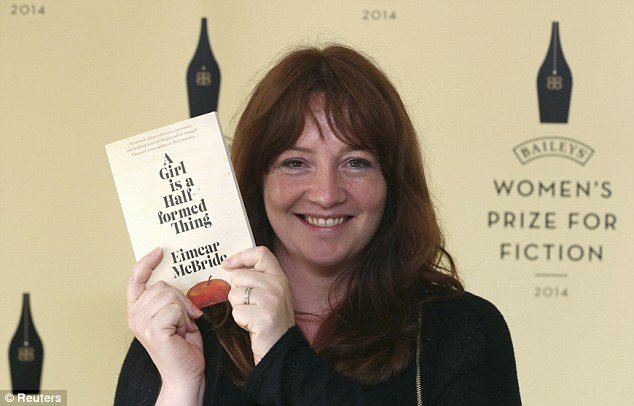Last night at the Southbank Centre in London, Irish author Eimear McBride won the 2014 Baileys Women’s Prize for Fiction for her debut novel A Girl is a Half-Formed Thing. She received £30,000 (approximately $50,385).
Established in 1996, the Baileys Women’s Prize for Fiction, formerly known as the Orange Prize, is given annually for a novel written in English by a woman and published in the United Kingdom during the previous year. The shortlisted finalists included Chimamanda Ngozi Adichie for Americanah (Knopf); Hannah Kent for Burial Rites (Little, Brown); Jhumpa Lahiri for The Lowland (Knopf); Audrey Magee for The Undertaking (Atlantic Books); and Donna Tartt for The Goldfinch (Little, Brown).
 The judges for this year’s prize were Mary Beard, Denise Mina, Caitlin Moran, Sophie Raworth, and chair of judges Helen Fraser, who called McBride’s winning book “an amazing and ambitious novel that impressed the judges with its inventiveness and energy. This is an extraordinary new voice—this novel will move and astonish the reader.”
The judges for this year’s prize were Mary Beard, Denise Mina, Caitlin Moran, Sophie Raworth, and chair of judges Helen Fraser, who called McBride’s winning book “an amazing and ambitious novel that impressed the judges with its inventiveness and energy. This is an extraordinary new voice—this novel will move and astonish the reader.”
A Girl is a Half-Formed Thing, which tells the story of a young woman struggling with sexual abuse and her brother’s brain tumor, is written in an experimental stream-of-consciousness style. McBride wrote the book in six months, and spent almost nine years trying to get the book published. It was finally picked up by the small UK-based Galley Beggar Press, which published it as their second book. The book has gone on to win the Kerry Group Irish Novel of the Year award and the Goldsmiths prize.
At last night’s award ceremony, McBride said of her win, “I hope it will serve as an incentive to publishers everywhere to take a look at difficult books and think again. We are all writers but we are all readers first. There is a contract between publishers and readers which must be honored, readers must not be underestimated.”
Photo: Reuters







Comments
Sinibaldi replied on Permalink
Refulgent sun.
Your delicate
look appears
in the field
to cover the
sadness of
an innocent
glimmer....
Francesco Sinibaldi